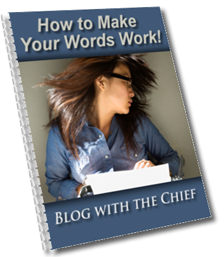What Do Writers Do?
(A longer version of this article originally appeared in Active Voice, the monthly newsletter of the San Francisco Chapter of the Society for Technical Communication.)
What do you do when you “write”?
This conundrum first came to me while editing a first draft manuscript on how to break through writing blocks. When stuck, so that you can’t write, I wondered, what are you not doing? Maybe analogies help.
Does a writer perform, as in a school play? Do you learn your lines? Say your little bit on cue? Hope the audience likes you? And take a bow?
Does the writer tailor a suit designed by someone else? Do you lay a pattern over the raw material? Cut along the lines? Sew the pieces together? Make a few minor alterations to fit? Tell the customer in the three-way mirror he looks great?
Does writing relieve constipation? Is the material all inside you, impacted, refusing to emerge? Does straining on the chair bring it out? Or only relaxation in its own good time? Is there an editorial Metamucil®? Or must gentler remedies prevail?
Finger painting, maybe? Moosh some runny stuff around? Lots of different colors mixed up? Broad strokes and fine? Tactile, visual, and auditory delights for your child self? Pin it to the wall and say, “Look what I did!”?
Do we bake from a proven recipe? Gather the finest ingredients? Chop, stir, beat and puree? Mix in the right proportions? Grease the pan, fold in, add heat until brown and tender? Let stand overnight?
Or does the writer create a new dish from scratch? Familiar ingredients? Combined in new proportions? Presented in a novel way? For hungry people with an appetite for something different?
Do we pan for gold like ’49ers squatting by the stream bank? Swirling rivers of water through mountains of sand and gravel? Hoping to find a glimmering nugget?
The puzzle came up again while reading another client’s manuscript. She wrote on how women typically trade on, and let their self-esteem ride on, their youth and beauty. Sooner or later “the midnight robber” takes away feminine allure, and women are left in agony and despair. She also had some strong ideas on how society should overcome it.
In her opening chapter she wove together the painful, vivid story of her childhood memories of a beautiful, lively mother contrasted with accounts of later visits in a mental ward for “unpredictables” as Mama turned into a shapeless, desperate crone. After each wrenching visit the writer escaped to the freedom and beauty of her own life, vowing she would have a different fate.
Her book proposal, with sample chapters, made the rounds and got roundly rejected. The last editor urged her to take a writing course. She dismissed the idea and asked my opinion of the work in progress.
If a writer learns and practices a disciplined craft, like baking cakes or tailoring clothes, she writes poorly with lots to improve: organization, logical flow, grammar, spelling and punctuation. She can learn it, slowly, or pay someone to do it for her.
But if the writer creates art from a personal experience filtered through thoughts, feelings and a point of view, she has the knack as well as anyone. I told her she did not need anyone to teach her how to do what came naturally.
Most clients, and bosses who don’t write, think we writers decide what to say and then write it down. Just like that. (Blocked, tortured writers also tend to think the first draft should go straight to the typesetter. And they seem crushed when it does not.)
Regular writers, paid or doing it for any kind of love, know a more complex reality: Get full, expel, make it into something. Conceive, nurture, give birth, educate. Write and revise. Sometimes revise again and again.
Bruce Bruggman, editor and publisher of the “San Francisco Bay Guardian”, says, “Write when drunk, edit when sober.” Not too much drunkenness, nor too much sobriety, but the middle way.
Do we write only when we tap the keys or grab a pen and paper? Do we also write when we let something happen inside before we record anything?
What do you think?
Heart of Marketing How to write persuasive “sell copy.”



